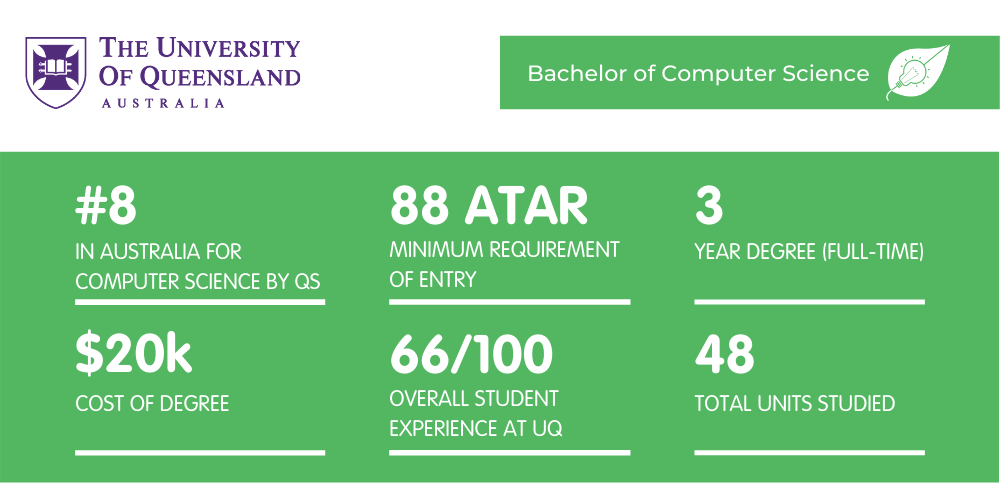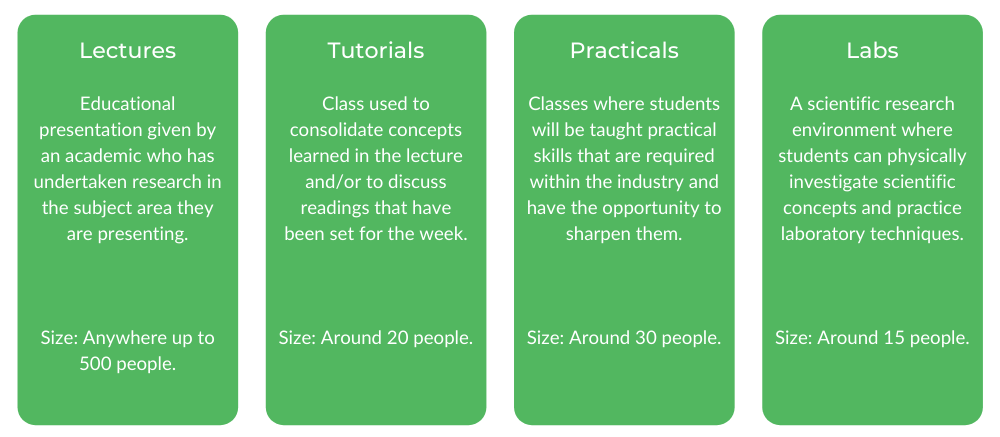Do you like the sound of studying a Bachelor of Computer Science at UQ, but are put off by all the unanswered questions you have about the degree?
Committing to a single area of study after high school is a big and daunting decision. A lot of different things need to be considered and a lot of questions need to be asked.
To help make this process a little bit easier, we’ve compiled all the information you could possibly need about pursuing Computer Science at UQ.
Let’s jump straight in!
What is a Bachelor of Computer Science at UQ?
Core Units and Majors
How to Get into a Bachelor of Computer Science at UQ
What’s the Teaching Format?
What’s the Faculty and Culture Like?
What is a Bachelor of Computer Science at UQ?
A Bachelor of Computer Science at UQ teaches its students how to apply algorithms and data theory to real-life hardware and software systems. It focuses heavily on the process of problem solving to address issues involving technology.
Students graduate with an extensive knowledge of computer programming, software development and data analysis.
This degree is ideal for anyone interested in working closely with computers, or simply looking to expand their digital literacy.
Can this degree be studied in conjunction with another?
Computer Science at UQ can either be studied on its own, or as a dual degree. A dual degree offers students the chance to study Computer Science alongside another degree from a different faculty.
This allows students to graduate with two qualifications and ultimately expand their future career options. Popular course combinations include Engineering, Laws, Business Management and Arts.
Honours
An Honours pathway is also available with this degree. Students in the Honours pathway complete an additional year of study on top of the compulsory three years.
In this final year the curriculum focusses on being effective leaders in Computer Science roles.
To gain entry into this program, students must complete a Bachelor of Computer Science from UQ or any other approved degree with a GPA of 5.0 within five years of applying.
You can find more information about the Honours program here!
Career Paths
There are various career paths that this degree can send you down. After graduating, you could become a:
-
- Cyber security analyst
- Data scientist
- Machine learning engineer
- Software engineer
- Technical business analyst
- Data engineer
- Statistical analyst
- Security architect
Core Units and Majors
A Computer Science degree requires 48 credit points worth of core units, major units and electives. The recommended full time study load is 8 units per semester.
What are the Core Units?
In first and second year, students complete their core Computer Science subjects, such as Theory of Computing, Introduction to Computing Systems and Algorithms and Data Structures.
All of these core subjects are designed to teach students the fundamentals of programming, providing a strong foundational knowledge for later years.
In Theory of Computing, students are shown why computer hardware is designed the way it is and how different programming languages can be used to build all sorts of impressive software.
Introduction to Computing Systems explains everything about the digital representation of data, looking at how data is digitally stored and communicated.
Finally, Algorithms and Data Structures introduces students to algorithms, demonstrating how they are used to build complex programming and software.
“They teach you how to actually approach problems within the computer science realm and how to fix them.” — Thomas Trebilcock, Bachelor of Computer Science III at UQ
In the third year, the course structure focusses on the completion of Major units and selected electives.
What are the Majors?
While choosing a major is not compulsory for this degree, it is highly recommended. This is because it offers a further area of specialisation that can be advantageous in the workforce.
At UQ, students have five majors to choose from:
-
- Cyber Security
- Data Science
- Machine Learning
- Programming Languages
- Scientific Computing
What is Cyber Security like?
In this specific major, students learn about all things security in the digital world.
It covers things like how to keep devices from attack or unauthorised access using programming and how to protect individuals, businesses and governments against cybercrime.
It also teaches students how to ethically hack computer software using appropriate techniques and strategies.
The Cyber Security major has a very practical focus and it is easy to see how the skills and content learnt can be applied to the workforce.
For more information about what each of these majors entail, head over to this page!
Electives
On top of the required core units, students are given multiple opportunities to pick different electives.
Some of these include specific Computer Science electives, such as Digital Prototyping, Design Thinking and Introduction to Web Design.
However, students are also able to choose from electives outside the Computer Science area of study.
These General Electives allow students to enrol in subjects belonging to any one of UQ’s different schools, including Architecture and Design, Arts and Humanities, Business and Economics. This cross-disciplinary learning is highly advantageous for students, exposing them to different ways of thinking and learning.
How to Get into a Bachelor of Computer Science at UQ
The ATAR cut-off for guaranteed entry into a Bachelor of Computer Science at UQ is 88.
What are the prerequisites?
In addition to these marks, it is also expected that students complete both a General English subject and a Mathematical Methods subject in high school.
A Specialist Mathematics subject is not a compulsory prerequisite, but it is recommended to give students greater flexibility with subject choice later on.
Alternate Pathways
If you do not meet the ATAR cut-off or the required prerequisites, do not stress! UQ offers various pathway programs and adjustment schemes to better your chances of acceptance.
There are multiple bridging courses available in mathematics, chemistry and biology. These can help you meet subject prerequisites and gain skills needed to succeed at university.
Furthermore, UQ allows prospective students to use the Special Tertiary Admissions Test (STAT) to meet an english or mathematics prerequisite, as well as gain a selection rank. It can be used on its own, with employment experience or alongside Vocational Education and Training (VET) qualifications.
Scholarships
The Alumni Advantage Scholarship in Computer Science is one of the scholarships offered at UQ to help disadvantaged students access university. This particular one awards $3000 to Computer Science students from an “under-represented cohort” such as those facing financial hardship.
What’s the Teaching Format?
UQ structures their teaching year using semesters. Content is taught through a combination of lectures, tutorials, practicals and labs.
It is a fairly rigorous workload, with students expected to complete 30-40 hours of study a week, including each of the aforementioned teaching formats and self-directed study.
Class Structure
Lectures
Lectures are approximately 2-3 hours in length and involve highly respected academics explaining course content using a presentation-style structure. They are often held in a large auditorium and live-streamed for people to watch from home.
Lecture sizes vary depending on the size of the course’s cohort, but they are usually quite large, with up to 500 students attending.
Tutorials
In tutorials, the content covered in lectures is further explained and unpacked to a smaller group. In this setting, students work closely with tutors and academics to ask questions and engage with important course information in a smaller and more casual setting than that of the lecture.
Here, a strong focus is placed on covering and understanding the theoretical components of the course so that this knowledge can be properly applied to practicals and labs. Tutorials are approximately an hour long and have 20 students in attendance.
Practicals
In practicals, tutors walk students through how to practically apply the theory learnt in lectures and tutorials. In groups of about 30, students run through basic programming challenges to familiarise themselves with the new content learnt.
They do this with close guidance from their tutors, a proximity which exists in practicals that make them the ideal place for students to get valuable assistance on assignments when needed.
Labs
Labs differ from practicals in the sense that they involve more independent work from students. Rather than being guided every step of the way by tutors, labs encourage students to independently work on programming and coding problems relating specifically to the theoretical content covered that week.
They are usually timed and assessed, meaning that they provide a good gauge of how you are fairing with coursework throughout the semester. A typical lab is made up of approximately 15 students.
Assessments
Assessments are a combination of exams and assignments, with the occasional essay thrown in the mix.
Exams are usually a series of mathematical equations or coding problems that students are required to solve on paper under timed conditions.
Assignments are longer math and programming questions that are turned into multi-step projects that students must solve.
Skills You Refine and Learn
UQ Computer Science students’ are taught a range of important skills which help them become highly competitive job-ready graduates. Since the degree’s teaching style focuses heavily on students solving complex problems in a digital landscape that is always shifting, the main skill sets taught are problem solving and adaptability.
In this degree, students are faced with really challenging programming problems, which more often than not, take a lot of trial and error to solve. As a result, students quickly learn to be resilient when dealing with difficult problems.
As mentioned before, this course has a pretty heavy workload. The computer concepts students are being introduced to are pretty heavy and can take quite a bit of time to fully comprehend. Because of this, students in this course learn to develop strong time management skills.
What’s the Faculty and Culture Like?
Computer Science at UQ is a really friendly and supportive cohort. Because it’s quite a challenging course, the cohort gets significantly smaller as the degree progresses. As a result, there is a real sense of camaraderie between the students that does remain.
The ability for Computer Science students to choose General Electives in other areas of study also means that you are able to meet and befriend people from all types of disciplines.
“A cool thing about Computer Science at UQ is that a lot of the classes you do mix with other disciplines like Electrical Engineering or Software Engineering. So I’ve actually made a lot of great mates from those courses.” — Thomas Trebilcock
The teaching faculty is said to be excellent and incredibly helpful. The faculty is relatively large, meaning that students feel very supported by staff who are always readily available to answer any questions.
Societies
The UQ Computing Society is the most relevant society to this degree.
They host a lot of events throughout the year, including networking functions, tutoring sessions and casual catch-ups over a few drinks.
Support Programs
UQ offers a range of student support services. For first-years, the Get Set program connects new students in similar or same studies with student mentors to help make the transition between high school and university easier.
The Meet a Mentor program connects engineering, architecture and IT students with professionals to help motivate, educate and empower future graduates. This program is available to second and third year students, helping them gain industry connections which may assist with future employment.
Jessica Arentz is a Content Writer at Art of Smart and an undergraduate student at the University of Sydney where she studies a Bachelor of Arts/Advanced Studies (Media and Communications) (Marketing). She currently volunteers at 2SER community radio station as a producer and newsroom reader. When not writing, you can find Jess searching the web for cheap flights or spending her days with her head buried deep in a book.






